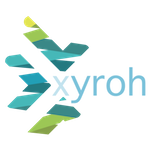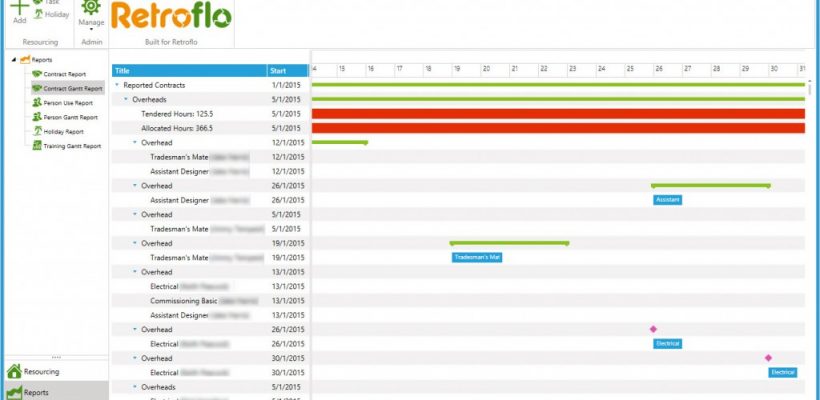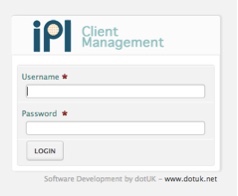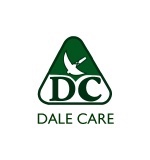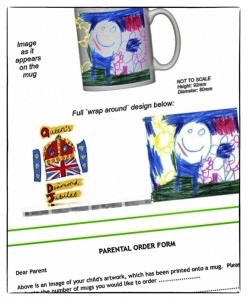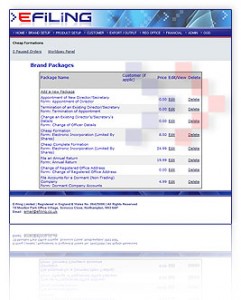Service Engineers Reminders Software Case Study
Prior to Xyroh, Andy was the founder of dotUK (A software development firm based out of Yarm and Stockton on Tees here in the North East), again specialising as a developer in mobile apps, web applications and desktop software for a number of business clients – this is one of those portfolio case studies for windows based resource planning app
Desktop Software
Desktop Software, or desktop applications are the built in or installed apps available to you on your desktop / laptop computer of choice, for many this is a Windows based PC, but it could be an Apple Mac or a variant of Linux. We can develop desktop software for all of those platforms, often a cross platform application that can operate across all three. This case study is for a windows based desktop software application, operating in a client / server environment ie multiple desktop users puplling data from the central database server.
Project Summary
The Service Engineers Reminder Software is a simple, single user, windows desktop app that helps tradesmen keep track of scheduled work, services, safety checks etc
Sometimes the simplest solutions are best, this service reminder app, which has been commissioned by a local heating engineer, will start life as a single user, stand alone, windows desktop application. However it is easily scalable into a multi user networked environment (with little to no infrastructure costs) and even options to sync / backup data through cloud services to make a multi user, multi site product.
The core functionality is to record when clients have products, services, or schedules that are due for renewal and offer a range of reminder options. As an example landlords are required to have annual gas safety checks which is a service the client offers. This app will allow this to be recorded, and when comes due the option to remind via email, text message, or generate a mail merge document that allows letters to be sent out in the post.
As always the focus is on specific functionality, ease of use, and value.
Desktop Software for Resource Planning Case Study – RetroFlo
Prior to Xyroh, Andy was the founder of dotUK (A software development firm based out of Yarm and Stockton on Tees here in the North East), again specialising as a developer in mobile apps, web applications and desktop software for a number of business clients – this is one of those portfolio case studies for windows based resource planning app
Desktop Software
Desktop Software, or desktop applciations are the built in or installed apps available to you on your desktop / laptop computer of choice, for many this is a Windows based PC, but it could be an Apple Mac or a variant of Linux. We can develop desktop software for all of those platforms, often a cross platform application that can operate across all three. This case study is for a windows based desktop software application, operating in a client / server environment ie multiple desktop users puplling data from the central database server.
Project Summary
This project was to create a Windows Based Resource Planning Application, allowing businesses to see at a glance upcoming resource availability and holiday allocations
This was the second of our recent commissions for bespoke windows desktop software, and was for an electrical contractor based here in the North East. The challenge to overcome here is the ability to see clearly, quickly the spread of human resources in upcoming months, both those engineers and fitters allocated to existing projects, and of course holiday time when resource is unavailable.
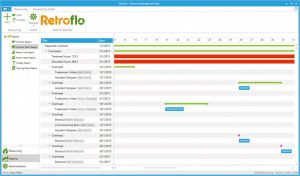
Our bespoke solution will record the allocation of staff resources to projects, and allow the categorisation of the labour types. It will also record upcoming staff holidays, with this combination of data managers will be able to scroll to a specific timeline and view, filtering down if need be, the allocation of resources and ability to schedule in, or not, additional work based on the still free resource.
This project is the precursor to a bigger solution, but allows us to focus on and solve immediate business problems for the client in a cost effective and timely manner
Industrial Programming Case Study – Glasgow Watersports
Prior to Xyroh, Andy was the founder of dotUK (A software development firm based out of Yarm and Stockton on Tees here in the North East), again specialising as a developer in mobile apps, web applications and desktop software for a number of business clients – this is one of those portfolio case studies for an industrial programming project
Industrial Programming
Industrial Programming is a term reserved for the programming of industrial equipment, pumps, valves, etc to control and monitor any number of simplex or complex scenarios. In many small business scenarios the distinction is being blurred with the advent of ‘Internet of Things’ products such as Hue Lights, Ring doorbells, Tado home heating automation etc – the concept however is the same, you turn things on and off.
In this case we are using a combination of a web and mobile based dashboard to turn on and off the paddle sports course pumps as required, the dashboards being the visible, more traditional development side, but the industrial programming being what happens behind the scenes to interface with the pump infrastructure.
Project Summary
The Glasgow Watersports project is a multi phased industrial programming project that will ultimately empower the user to control and administer the canoe course pumps and lighting from mobile devices, and place site bookings over the web.
The core control system part of the project allows for programmatic control of the sites pump, lighting, and klaxon systems using the industry standard Modbus protocol. This is being offered in conjunction with Retroflo, a North East based Electrical Contractors and bringing on board their expertise in industrial process control.
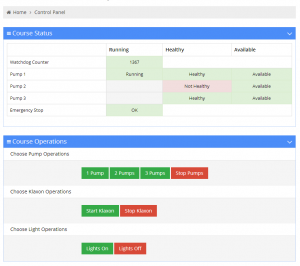
The full flow of the development will commence with a web based booking system provided by dotUK, end user bookings are then pushed privately to the Glasgow Watersports site where the onsite infrastructure will allow users to access their booking and the control systems via any wifi enabled device.
Local users can then control the pump output (strength of water flow) on demand in accordance with the abilities and expectations of their group.
A full remit of expected industrial safety, and health and safety best practices are of course in place but this investment allows the end user, through dotUK’s software development expertise, to bring control and a more beneficial user experience to the end user.
Jacksons Law Livetrack – Case Management
Prior to Xyroh, Andy was the founder of dotUK (A software development firm based out of Yarm and Stockton on Tees here in the North East), again specialising as a developer in mobile apps, web applications and desktop software for a number of business clients – this is one of those portfolio case studies
Summary
Jacksons Law is a major North East law firm that advises both commercial and private clients and practices across all core areas of law. Their need was for a central information management portal that they could use to update and share information securely with clients with regards the progress of cases
Technical
Client Jacksons Law LLP – Major North East based Law Firm
Platforms Web
Technologies PHP, CSS, JQuery, Javascript, MySQL, Document Management
Development Web Development
Case Study
Jacksons Law practice law in a wide variety of practice areas and as such the individual needs, or specialisations of case management in one practice area can differ widely from those of another. In addition Jacksons have a wide variety of clients all of whom have a range of individual case and account reporting expectations, the challenge for dotUK was to present a solution that could encompass all needs, yet remain simple and manageable.
With Jacksons operating out of multiple sites, and to alleviate information security issues of allowing external users into their infrastructure it was decided that a web based system would be the most cost effective and simplistic to deploy and mange. In addition it would allow us to operate a mobile optimised interface for end client users that operate on site and on the road.
The system was built with a concept of case ‘Systems’ where a System mapped generally to a specific area of legal practise, eg Personal Injury, Conveyancing, Employment Law etc, in this way we could apply system specific modules to the cases within and
hence extend the specific functionality. This also allowed us to extend Systems for use by key clients, offering an enhanced branding experience for key client end users, enhanced and client specific reports and metrics, and internally SLA highlighting to ensure contractual targets were met.
The overall concept was however kept simple, allowing Jacksons staff to create cases within their permitted systems, allocating cases to end clients and updating cases with notes, attach documents, and report key milestones. In addition modules that allowed the client to keep track of running costs, and report on costs on a cost centre basis were created. External access is managed fully by Jacksons, with a hierarchy of client user permissions that allow data access to be restricted in a granular manner to department heads or end users as required.
The system is accessed over SSL as an industry standard, and is hosted on dotUK’s own Cloud hosting infrastructure here in the North East that allows use to offer high availability, fault tolerance, non interruptive snapshot backups and clustering options based on the clients requirements.
For more information, or to discuss case management or end user self service solutions tailored to your industry requirements please don’t hesitate to contact us for a consultation.
IPL – Quote Management and CRM System Case Study
Prior to Xyroh, Andy was the founder of dotUK (A software development firm based out of Yarm and Stockton on Tees here in the North East), again specialising as a developer in mobile apps, web applications and desktop software for a number of business clients – this is one of those portfolio case studies
Summary
International Procurement, a Stockton on Tees (North East) based supplier of severe service isolation solutions, needed a means to better automate and streamline their already complex request, quote, supply and invoicing workflow,
Technical
Client International Procurement – Critical & Severe Service Isolation Solutions
Platforms Web, Web Services, Kashflow
Technologies PHP, CSS, JQuery, Javascript, MySQL, REST API, JSON, Kashflow, SOAP
Development Web Development, Web Services Integration, Kashflow Integration
Case Study
The IPL sales process workflow is complicated by the very precise specification and requirements attached to each and every order, often a customer enquiry for a product will be met with a variety of options from a supplier, may have to meet complex supply requirements (including lengthy import, export and trade embargos), and even build to order solutions.
With that in mind, dotUK built, upon their in-house web services framework, a cloud based software solution that runs in the web browser, and is accessible both internally, to allowed users on the road or in home working environments, and to mobile and smartphone devices over the web, bespoke to IPL’s requirements.
The summary workflow required was in essence;
• Record Enquiry
• Manage Supplier requests (with quote and attached document management) to fulfil the enquiry
• Freeform Quote Generation (Multiple Quotes and Variations)
• Quote to Order process
• Supplier Purchase Order generation to fulfil the client order
• Invoice generation, and customer management to the web based Kashflow accounts software
Where document generation was required we standardised on PDF as a consistent, non-editable output format, and the system automatically maintains copies of the last generated version (eg for quotes), and also maintains an archived history of prior versions. The system also allows for management of archived records, repeat ordering, and reporting on sales and overdue enquiries.
The Kashflow accounts software integration, also web based, through it’s own SOAP based API meant that simple requests such as pushing invoices into their accounts software moved from being a one line requirement, with traditionally a costly, time consuming and frustrating integration phase, became as simple as it should be. A custom written Kashflow module was written as an extension to our web services framework that integrated seamlessly, and allowed us to continue using the same methods for data exchange and document generation. Something that wouldn’t have been possible with traditional desktop based accountancy packages
Christmas Cards for Schools Clustered Print Generation
Prior to Xyroh, Andy was the founder of dotUK (A software development firm based out of Yarm and Stockton on Tees here in the North East), again specialising as a developer in mobile apps, web applications and desktop software for a number of business clients – this is one of those portfolio case studies
Summary
Christmas Cards for Schools based in Middlesbrough here in the North East, part of Fundraising Creations, offer Fundraising solutions for Schools, their primary product being the production of bespoke printed and customised Christmas Card packs personalised with the pupils name, class and of course their own drawing. Having been responsible for the production of in excess of 1.1 million cards in the Christmas 2013 season efficiency and scalability are high priorities
Technical
Client Christmas Cards for Schools Ltd – Middlesbrough based School Fundraising
Platforms Linux, Web, WebServices,
Technologies PHP, Perl, CSS, Jquery, MySQL, REST, ImageMagick, Apache, Clustering
Development Web Development, Web Services Integration, Synchronisation
Case Study
To understand the scale and requirements to create, print and distribute in excess of 1million Christmas Cards in a 3 month period each year it’s probably beneficial to understand the workflow required, and the stages at which dotUK have been able to build out and scale, thus adding capacity each year.
• Participating Schools are sent Artwork kits
• Kits are returned and the drawings are scanned, grouped, and filed into our Web Based storage system
• School batches are processed within our processing cluster leading to the creation of digital print ready personalised images (1 Per child)
• Print ready images are synchronised to the print partner who takes responsibility for print and distribution, feeding back status to the storage system dashboard.
Due to the system being highly seasonal dotUK have built a bespoke hosting infrastructure that offers a cost effective, but highly scalable hosting solution. Services that are required year around are separated from the seasonal processing cluster, thus offering a base line cost for the majority of the year. The processing cluster is build in such a manner, that additional processing nodes can be added at 15minute deployment windows, and will automatically join in the pool of processing power, but can be removed when surplus thus reducing hosting and running costs that are unwarranted.
To maintain maximum data integrity, control, and compliance in excess of UK Data Protection requirements, the hosting cluster and processing engine is a bespoke, privately hosted solution provided, hosted, and monitored by dotUK
Depending on the solution offered to the school the workflow may include digital samples that are offered initially to the school prior to order, but ultimately school co-ordinators enter their school order quantities online through their own access portal, which triggers the print cluster and sync services to push final orders to the print partner.
In addition to the core card generation workflow, we also generate supplementary personalised products, and fully automate other ancillary services such as billing, marketing / kit requests and the ability for parents to view online samples prior to order
Dale Care – Call Log Comparison Case Study
Prior to Xyroh, Andy was the founder of dotUK (A software development firm based out of Yarm and Stockton on Tees here in the North East), again specialising as a developer in mobile apps, web applications and desktop software for a number of business clients – this is one of those portfolio case studies
Summary
Dale Care are a home care provider based in the North East of England, and operate in County Durham. They have an existing call confirmation system that confirms calls within the Staffplan system, however logged calls did not tally with actual calls, and it was time consuming to manually compare
Technical
Client Dale Care – North East and County Durham based home care provider
Platforms Windows Server, SQL Server, Staffplan, NEC Phone System
Technologies Python, Windows Exe
Development Software Development, Windows Server
Case Study
A key factor in how Dale Care manage, and bill their home care services is through quickly, and accurately confirming calls made by carers to clients at their homes, into the Staffplan management software specific to the home care industry. This is done primarily by the carer ‘phoning home’ from the client’s home, and the CLI is matched, recorded, and the visit logged into Staffplan.
This matching is currently done by a call logging box the runs in parallel to the existing NEC phone system and is monitored by a standalone windows server based application. However not all calls are being confirmed within Staffplan, yet the are identified in the NEC Phone System logs, which leads to discrepancies in payroll claims, and potentially under billing for clients as the system does not believe home visits have been made.
As a short term solution dotUK provided a daily analysis tool that runs as a scheduled task that picks up all call logs on the dedicated inbound phone system trunk and attempts to match them with confirmed calls in Staffplan, this matching is done with a time threshold to allow for subtle time logging differences, and highlights any calls the phone system has identified that are not properly confirmed. These calls are then output on a daily management report that allows Dale Care staff to batch update Staffplan, and correct the anomalies, and saving significant man-hours in chasing manually reported discrepancies.
Both the NEC Phone System, through the My Calls add on, and Staffplan utilise MS SQL Server s the back end database, and for simplicity dotUK chose to utilise a simple Python script compiled as a 64bit Windows Server executable running as a scheduled task, as the method to implement this call comparison.
Stockton’s Big Challenge Active Travel Portal – Case Study
Prior to Xyroh, Andy was the founder of dotUK (A software development firm based out of Yarm and Stockton on Tees here in the North East), again specialising as a developer in mobile apps, web applications and desktop software for a number of business clients – this is one of those portfolio case studies
Summary
Stockton’s Big Challenge is a web based community competition initially funded by Stockton on Tees Borough Council, NHS Stockton on Tees, the Big Lottery and Sustrans. The aim is to build awareness of Active travel and encourage a healthier lifestyle across Stockton by encouraging people to walk or cycle to work.
Technical
Client: Sustrans / Stockton Active Travel
Platforms: Web, Web Services,
Technologies: PHP, CSS, JQuery, Javascript, MySQL, Animation, Charting
Development: Web Development, Web Reporting, Jquery Animation
Case Study
Stockton’s Big Challenge was pitched as lottery funded concept aimed at encouraging local (Stockton on Tees Borough) Employees, and Employers alike to ditch the car and cycle or walk to work, in essence embrace ‘Active Travel’ and enjoy a fitter healthier lifestyle – all through the power of competitions


The competition premise was simple, each and every time you under took ‘Active Travel’ you logged in to the site, recorded the date, distance, time, and reason for travel. These journeys were then logged and your cumulative total displayed in terms of miles travelled, calories used, kg of fat burnt, kg of CO2 saved, and Parmo’s!
For those not local to Teesside the Parmo is a regional delicacy of note (http://en.wikipedia.org/w…) which through it’s ingredients of cheese, béchamel sauce, and being deep fried has a ridiculously high calorie count!
The Parmo Calculator was the welcomed challenge in the development as the concept was that we would allow site users to visualise their journey in terms of Parmo’s dropping to a plate, the shock factor being the tiny fraction of a Parmo that most journey’s equated to. We also made the calculator available as a stand alone tool that visitors could play with and drum up publicity. It worked, gaining the challenge and dotUK local coverage in local press, radio interviews, and even linked to and referenced by the Wikipedia article above.
The competition itself was broken down to allow businesses of different sizes to also compete by entering teams of employees (the cumulative score of their employees being totalled), as well as the individual completion. All user journeys, their ‘Parmo Counts’ and a dynamically generated report of miles walked / cycled over time was available in the individual users portfolios.
From an administration point of view, all aspect of the system were run form a secure web based control panel, this covers both user management, flagging ‘suspect’ journey logs, content management, and competition and winner management. The competitions were designed to be run time and time again between specific date ranges so we built tools that allow new competitions to be defined and journeys automatically entered between the relevant dates. Some winners prizes were also drawn at random so we created tools that allowed winners to be picker honestly.
When a competition is active the real-time statistics are published to both a widget on the home page and also to a dedicated live results page showing the scoreboard in terms of individuals and employers in the region. To further motivate year on year competition the historical archives of past competition results are permanently available and automatically generated.
Wrapped around the competition element of the site is the content management system. Near all content on the site it controlled through our own build web based content management system. Each page on the front end consists of one or more content blocks and the output content of those blocks is created by the administrator using the WYSIWG (What You See Is What You Get) editor.

This means that the administrator does not need to know, or have any real understanding of HTML or web scripting languages, they can simply type as if it were a regular word processor and format text style, colour, size and alignment with ease. In addition we created a web based media manager which allowed the simple upload of images to be embedded in the content thus allowing for the simple creation of visually rich, engaging content for their community.
Content wise these tools allowed them to manage 20+ pages of unique content instantly on demand, and engaging users beyond the competition. Content included local events, Bike maintenance tips, links to local resources and cycle path maps, the Sustrans Cycle network journey planner and much, much more.
Art Screen Prints – Cross Platform Mugs App Case Study
Prior to Xyroh, Andy was the founder of dotUK (A software development firm based out of Yarm and Stockton on Tees here in the North East), again specialising as a developer in mobile apps, web applications and desktop software for a number of business clients – this is one of those portfolio case studies
Summary
Art Screen Prints based in Guisborough here in the North East specialise in producing print based fund raising merchandise for schools, clubs and other associations. One such product is ceramic mugs printed with the pupils drawing. In order to best represent the potential end product the need to produce Parental Order Forms (POF’s) that are personalised with the pupil’s details, and as close as possible to a final representation of the Mug printed with the pupils drawing. We would also need, within the same workflow, to print the final print ready templates in PDF format for use in the printing process,
Technical
Client Art Screen Prints – Guisborough based School and Fundraising Print
Platforms Apple Mac, Windows
Technologies C#, Mono, GTK+, .Net, ImageMagick
Development Desktop Software, Mac Software, Windows Software, Cross Platform Software
Case Study
One of the unique requirements of this software development was the fact that the client used a mixture of both Apple Macs, and Windows based PC’s and as such this tool would potentially need to run, in the same manner, across both platforms.
The workflow is in essence two fold, presented with a folder of pre-scanned images (grouped by Class, or other equivalent organisational hierarchy), the desktop application we developed would need to take this feed of images, process them, and generate one, or both of;
- Print Ready, PDF Formatted print template for the actual scaled image to appear on the Mug
- A Parental Order Form to be distributed to the schools representing a final printed mug as closely as possible.
To do this we built the application utilising the Mono framework (a Cross platform representation of the C# language that allows applications to be built from a single codebase under Windows, Mac, and Linux). However as this was a desktop application and we had to consider the User Interface (UI) it was also necessary to make a decision on the UI framework. In the end we settled on GTK as the best performing, simplest, multi platform graphical interface framework, for what was as an interface quite simple.
The application itself was mostly a wrapper around pre-generated ImageMagick (A cross platform software suite for manipulating images programmatically) commands that we built to create both the print template, and the POF. Particularly challenging was the need to take a flat two dimensional image, and create the effect of wrapping and warping the image ‘around’ the Mug so as to represent what the human eye would see in the flesh.
In addition, owing to the batch processing and time it would take, we had to ensure to user asynchronous event based programming within the apps interface to ensure that a consistent update on progress was fed back to the user, without the application timing out, or ceasing to respond as it would with lengthy synchronous waits.
Thanks to our success the project grew to encompass a sister project for the generation of Calendar templates, and associated order forms.
Efiling – Web Based Company Formation Software
Prior to Xyroh, Andy was the founder of dotUK (A software development firm based out of Yarm and Stockton on Tees here in the North East), again specialising as a developer in mobile apps, web applications and desktop software for a number of business clients – this is one of those portfolio case studies
Summary
Efiling is an award winning online company formations software product that was originally developed by dotUK and had undertaken a number or significant revisions and expansions in the lifetime of the product
Technical
Client Efiling Ltd – Online Company Formations Software
Platforms Web, Web Services, Kashflow, XML Gateway
Technologies PHP, CSS, JQuery, Javascript, MySQL, REST API, JSON, Kashflow, SOAP, XML, Python
Development Web Development, Web Services Integration, Kashflow Integration, Companies House Integration
Case Study
The Efiling Web Based Companies House Software product was initially conceived with the core functional requirements of offering a web based medium through which instruction to the Companies House Gateway could be sent, on receipt of which the gateway would act upon those instructions. Examples of commands which could be instructed include;
- Formation of a UK Company (Eg Ltd, Plc etc)
- Add / Modify / Resign a Director
- Add / Modify / Resign a Company Secretary
- Articles of Association & Memorandum
- Change Registered Office
Version 1 of the software, developed exclusively by dotUK was utilising the Companies House Email Gateway, this protocol mean that instructions were issued by embedding commands in the email message subject and the payload (data fields, attachments etc) were embedded in properly formatted email message body. Responses from the Gateway were equally sent via email to a dedicated mailbox which was polled and monitored at the Efiling end.
Efiling is a multi tenanted system, which means the core platform is used by a near unlimited number of brand owners / companies withcompany formation needs. To function in this way data security and segregation is paramount as under no circumstances can data ‘leak’ between tenants on the system, and we built robust practices and data references into place to ensure this never happened. It also added significantly to the complexity of the system as we then had to manage website templates, company names, Companies House account details, email addresses and domains to manage, in essence near every variable in the system had to be configurable on a per tenant basis.
Billing for orders was another challenge to be managed, end user payments were taken by credit card on order, however brand owners were split between pre-pay (An account with a preloaded positive balance of funds) and credit accounts (Accounts with a preset maximum negative balance according to their credit limit), so we built a complex accounting structure that allowed for both charging models, and of course all associated reporting, statements, and invoicing required. Pricing levels (Both to Efiling, and charged by tenants to their clients) was also configurable and changeable on demand.
As the product matured additional features were added, which included expanding the standard statutory Companies House product offerings to allow tenants to offer bespoke, bundled packages, which included their own value add services (eg Company Secretarial, Mail Room services, offline products such as bound articles, hard copies of certificates etc). These were managed on a per tenant basis so significant upgrades to the tenant administration tools were made, and also to Efiling’s own system administration tools which sat above the tenants as an overview.
Soon Companies House began the process of decommissioning the email gateway service, which worked well, but was limited in terms of speed of service due to the delays faced in email delivery, and introduced a new XML based gateway. This gateway is in essence a secure web service that listens real time for commands sent direct over https (secure web traffic) and using documented (mostly!) XML documents as the payload. The benefits this service offered were that responses to instruction delivery were often available instantly, and it allowed us the option to ‘poll’ the gateway periodically for updates as opposed to wait for an email to arrive. It also increased reliability as we were communicating direct with the gateway as opposed to the round robin route email can on occasion take. dotUK were heavily involved in this transition, and the opportunity was taken to significantly improve other areas of the system such as document generation and storage.

Unfortunately it became apparent as the project progressed that some areas of the new gateway functionality were incomplete, undocumented, or not tested which meant we were frustrated in our ability to communicate progress to the client. However we took steps to optimise our time as efficiently as possible and made sure that we managed the project fully, this included taking responsibility for liaising with Companies House direct (who’s hands were tied by their own third party development team) and on occasion direct with the gateway developers themselves. Ultimately we were able to build and conclude testing of instructions in parallel with Companies House as we moved towards the deadline for switch off of the old email service. This was a regulatory deadline and was immovable.
Since then we have also been involved in other third party integrations, such as feeding bank account application into the Barclays Business accounts service (again an XML based gateway) and integration with the Kashflow web based accounts software using their SOAP based API. The advantages of using Kashflow were that it meant tenant accounting transactions were ultimately delivered direct into their accounts package, new customers automatically created, invoices and credits posted, thus automating tenant admin processes, actually reducing the amount of functionality required within the Efiling Back End, and actually adding significant value to the proposition.
For more information about Efiling, or to enquire about licensing their web based company formation software technologies please visit www.efiling.co.uk
